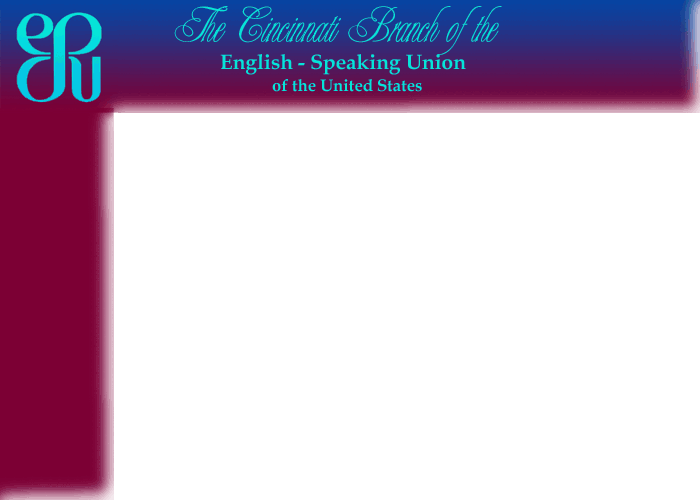
The English-Speaking Union of the United States is a non-profit, non-political, education organization whose mission is to promote scholarship and the advancement of knowledge through the effective use of English in an expanding global community. The ESU operates through a network of 78 Branches throughout the United States, including the Cincinnati Branch, and shares a common mission with other Unions in over 50 countries around the world. Members provide financial and volunteer support to sustain the ESU's education programs as well as take part in seminars, lectures and other social events. Members can benefit greatly from the personal relationships and international exposure gained from ESU activities.
Along with the National & International ESU, the Cincinnati Branch promotes communication, international scholarship, and understanding by reaching out to people of all nationalities, ethnic backgrounds, and cultural perceptions through the medium of the English language.
Since its founding in 1920, the ESU has been the only global, non-political organization specifically dedicated to recognizing the growing importance of the English language in an increasing interdependent world.
The Cincinnati Branch is one of more than 78 American branches. In addition, the ESU has representatives and branch offices in more than 50 other countries.
HISTORY OF THE ENGLISH-SPEAKING UNION
In 1920, just two years after he founded an organization in London "to draw together in the bonds of comradeship the English-speaking peoples of the world, British journalist Sir Evelyn Wrench met with distinguished Americans in New York to form The English-Speaking Union of the United States. From the beginning Wrench saw both organizations as presenting a "community of thought which would produce a community of action." Activities were to focus not only on Britain and the United States but on the Commonwealth and indeed on all those who spoke English.
Throughout its history, the ESU would work to encourage the exchange of people and ideas among the English-speaking peoples. Scholarships to bring British educators to the United States were established in 1923 and named after Sir Evelyn's friend and U.S. Ambassador to the U.K., Walter Hines Page. These scholarships still exist.
Although nonpolitical, the ESU presented international speakers on the issues of the day. In those early days, they often addressed the topic of naval disarmament and the repayment of war debts.
With the outbreak of WWII much of the ESU's attention was concentrated on war-related projects. The ESU Overseas Children's Committee placed over 1500 people in the US, many of them unaccompanied children. The ESU Officers Club provided recreation facilities with the help of about a thousand volunteers.
After the War the ESU continued in its tradition of scholarships, hospitality and the analysis of current issues. The International Schoolboy Exchange and the Isabella Carden Griffin Exchange of girls were established as Secondary School Exchanges which enables American and British teenagers to spend a post graduate semester or year in the opposite country on a full scholarship provided by participating schools. The Books-Across-the-Sea Program was adopted by the ESU. Through this program American publications are selected annually which have made an exceptional contribution to the interpretation of life and culture in the United States and distributed to Great Britain, the Commonwealth and other countries, and such publications from English-speaking countries are collected in the United States.
Since 1968 Luard Scholarships have been awarded to students attending United Negro College Fund institutions and Hampton and Howard Universities, enabling recipients to spend their junior year at the British University of their choice.
In the 1970's the English-speaking Union developed an increased awareness that the special relationship enjoyed by the US and the Commonwealth was dependent not only on a shared heritage but on a shared language. More of the ESU's resources were dedicated to expanding the use and comprehension of English throughout the world. In 1976 the ESU took over the English in Action program, a one-to-one English conversation program between American volunteers and foreign residents in the United States.
In 1983, the ESU started the National Shakespeare Competition, which is now the ESU's largest educational initiative, both in terms of outreach and visibility. Working in conjunction with participating Branches and local schools, the Competition provides teachers with a curriculum-based program for introducing and promoting the study of Shakespeare. Through the memorization and interpretation of a monologue and sonnet, students are encouraged to develop their literary talents and communication skills.
From Sir Evelyn Wrench's dream the two English-speaking Unions have grown and expanded around the world, with ESUs existing now in more than 50 countries. Today, ESUs can be found in such traditionally non-English-speaking countries as Argentina, Bulgaria, China, France, Germany, Japan, Portugal, Russia and Yugoslavia.